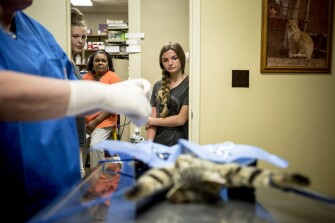As they attract a new wave of attention and support in schools across the country, career and technical education programs grapple with new challenges: How should they maintain program quality and weed out career paths that lead students to dead-end jobs? As high-flying programs become popular and more academically rigorous, how can educators ensure that they remain demographically diverse? And how can schools do a better job of getting the word out to all students about all of these new college and career options? Photographers Mark Abramson, Andrea Morales and Joe Buglewicz worked with Education Week reporter Catherine Gewertz on a three-part series for Education Week that takes a look at the challenges and opportunities faced by three states’ career and technical education programs.













